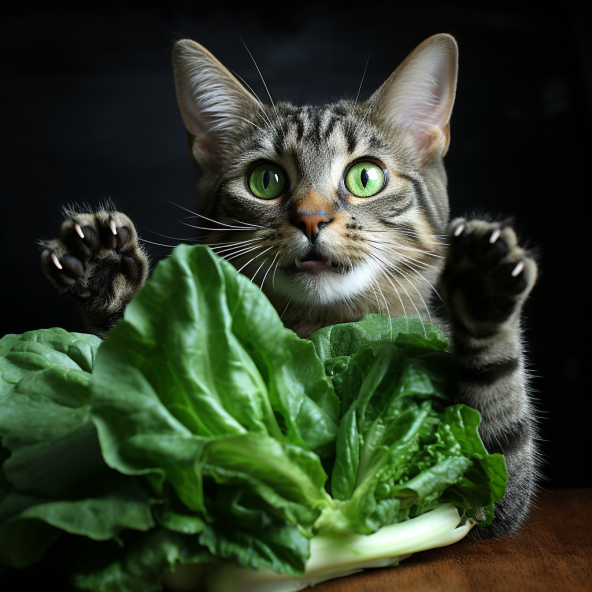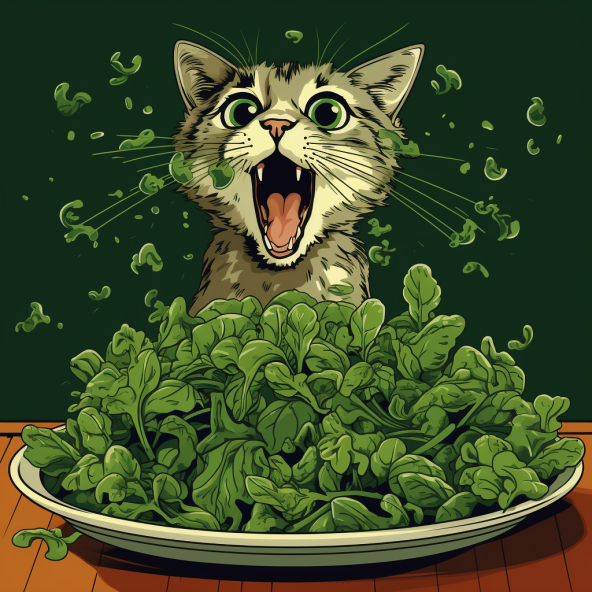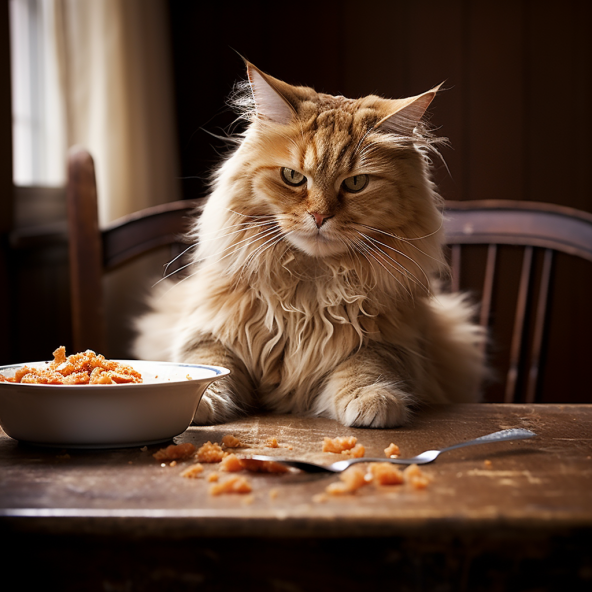
In the quest to offer our feline friends a diet that’s both nutritious and exciting, many cat owners ponder the question: Can cats eat spinach? It’s a valid inquiry, as we often hear about the health benefits of leafy greens for humans. But when it comes to the well-being of our cats, it’s essential to consider their unique dietary needs. In this post, we’ll explore the myths and facts surrounding cats and spinach, and provide you with the knowledge to make informed decisions about your cat’s diet.
The Nutritional Breakdown of Spinach for Cats
Spinach is known for its rich content of vitamins and minerals beneficial to humans, but how do these nutrients translate to feline health? We’ll dissect the nutritional value of spinach and discuss whether these benefits apply to your furry companion.
Risks of Feeding Spinach to Cats
While spinach might be a powerhouse of nutrients, it’s not without its risks for cats. We’ll delve into the potential dangers, including the risk of oxalates, which can lead to health issues in cats. Understanding these risks is crucial for any cat owner considering adding spinach to their cat’s diet.
How Much Spinach Can a Cat Safely Eat?
Quantity is just as important as the food itself when it comes to feeding your cat. In this section, we’ll talk about how much spinach is safe for your cat, if any, and the signs of overfeeding to watch out for.
Alternatives to Spinach in a Cat’s Diet
If spinach isn’t the best option for your cat, don’t worry—there are plenty of other ways to ensure they receive the nutrients they need. We’ll offer alternative foods and supplements that can safely contribute to a balanced feline diet.
Consulting with a Veterinarian: When to Seek Professional Advice
Before making any significant changes to your cat’s diet, it’s always wise to consult with a professional. We’ll discuss the importance of veterinary guidance and how to approach this topic with your vet.
By unpacking these key areas, we’ll provide a thorough understanding of the spinach and cat conundrum, helping you make the best choices for your cat’s health and happiness. Let’s begin our deep dive into the world of cats and spinach.
The Nutritional Breakdown of Spinach for Cats
Spinach is often lauded for its high levels of vitamins A, C, K, and several B vitamins. It’s also a good source of iron, calcium, potassium, and dietary fiber. For humans, these nutrients support a range of bodily functions from immune response to blood clotting and bone health. But the question remains, does spinach offer the same benefits to cats?
Cats are obligate carnivores, which means their natural dietary needs are met primarily through the consumption of meat. Unlike humans and omnivorous animals, cats have evolved to extract the nutrients they require from animal tissue. Their bodies are not designed to process large amounts of plant matter, so the nutrients in spinach may not be as bioavailable, or readily absorbed, by a cat’s digestive system as they are in humans.
However, that doesn’t mean that spinach has no place in a cat’s diet. In moderation, spinach can provide a source of fiber, which can aid in digestion and help prevent hairballs. Additionally, small amounts of the vitamins present in spinach could potentially offer health benefits to cats, although they generally receive sufficient vitamins from a well-balanced commercial cat food.
It’s important to note that cats synthesize vitamin C on their own, and excess dietary vitamin A can be toxic to cats since they cannot regulate it in the same way humans can. Because of this, cat owners should be wary of providing too much spinach, as it could lead to an overabundance of certain nutrients, potentially causing more harm than good.
In the next section, we will look at some of the risks associated with feeding spinach to cats, which is just as critical to understand as the potential benefits.

Risks of Feeding Spinach to Cats
While spinach can offer certain nutritional benefits to cats, there are also risks involved that cat owners should be aware of. One of the primary concerns is the presence of oxalates in spinach. Oxalates are compounds that can bind with calcium in the body, forming crystals that can lead to kidney or urinary tract issues, including the development of calcium oxalate stones. Cats are particularly susceptible to urinary tract problems, and those with a history of urinary issues should avoid oxalate-rich foods like spinach.
Another potential risk is the possibility of pesticide residue on the leaves of spinach, which can be harmful to cats. Organic spinach or thoroughly washed conventional spinach may reduce this risk, but it cannot eliminate it entirely. Pesticides can cause a range of health problems in cats, from mild gastrointestinal distress to more severe neurological issues.
Additionally, the high fiber content in spinach, while beneficial in small amounts, can cause digestive upset in cats if fed in large quantities. Cats who consume too much spinach may experience diarrhea or vomiting, which can lead to dehydration and other health complications.
It’s also essential to consider the form in which spinach is offered to cats. Cooked spinach is generally safer than raw, as cooking can reduce the levels of oxalates. However, cooking also depletes some of the nutrients, and adding ingredients like garlic or onion to cooked spinach can be toxic to cats.
Given these risks, cat owners must weigh the potential benefits against the dangers of feeding spinach to their pets. If you choose to include spinach in your cat’s diet, it should be done cautiously and in moderation, as part of a balanced diet, and not as a primary food source.
In the following section, we’ll discuss the appropriate amounts of spinach to feed your cat and how to recognize the signs of overfeeding.

How Much Spinach Can a Cat Safely Eat?
Determining the right amount of spinach to feed your cat, if any, is a delicate balance. Since cats are obligate carnivores, their diets should be predominantly made up of high-quality animal proteins. Spinach should only be considered as an occasional treat, not a staple of their diet.
If you decide to introduce spinach to your cat’s diet, start with a very small amount to see how they react. A good rule of thumb is to offer a few small, cooked spinach leaves once a week or less. Remember, the key is moderation. This small quantity can provide the slight nutritional benefits without overwhelming your cat’s digestive system with something it’s not well-equipped to handle.
Monitor your cat closely for any signs of gastrointestinal upset or allergic reactions. Symptoms to watch out for include vomiting, diarrhea, or changes in urination habits. If you notice any of these signs, discontinue feeding spinach immediately and consult your veterinarian.
It’s also important to factor in your cat’s overall health and dietary needs. For instance, if your cat has a history of kidney stones or other urinary tract issues, it may be best to avoid spinach altogether due to its oxalate content.
When introducing spinach to your cat, ensure that it is plain, with no added salts, oils, or spices, as these can be harmful to your pet. Cooking the spinach lightly can make it easier for your cat to digest and reduce the oxalate content, but it should still be given in very small amounts.
In the next section, we will consider alternatives to spinach that can provide similar nutritional benefits without the associated risks, to ensure that your cat maintains a balanced and safe diet.
Check out our other articles on what we can and can’t include in our cats diets:
Consulting with a Veterinarian: When to Seek Professional Advice
Before making any significant changes to your cat’s dietary routine, it’s imperative to consult with a veterinarian. Your vet can provide personalized guidance based on your cat’s specific health needs, age, and lifestyle. Here’s how to approach this critical step:
Evaluate Your Cat’s Current Health Status
Before your consultation, take note of your cat’s current health, including any recent changes in behavior, appetite, or weight. This information can help your vet make informed recommendations.
Prepare a List of Questions
Write down any questions you have about your cat’s nutrition, including the potential inclusion of spinach or alternatives in their diet. Don’t hesitate to ask for clarifications on anything you’re unsure about.
Discuss Your Cat’s Diet History
Provide your vet with a detailed account of what your cat typically eats, including brand names and portion sizes of food, as well as any treats or supplements. This will help your vet assess the nutritional balance of your cat’s diet.
Be Open to Professional Recommendations
Your vet may suggest dietary adjustments or specific products that are tailored to your cat’s individual needs. Be open to these suggestions and understand that they are made with your cat’s best interest in mind.
Follow-Up After Dietary Changes
If you and your vet decide to introduce new items into your cat’s diet, monitor your pet closely. Schedule a follow-up appointment to discuss any observed effects and ensure the changes are having the desired impact on your cat’s health.
By having a thorough and open dialogue with your veterinarian, you can make confident and informed decisions about your cat’s diet. This professional partnership is invaluable in maintaining your feline friend’s health and well-being.
We’ve covered a lot of ground in this blog post, from the nutritional analysis of spinach for cats to understanding the associated risks, appropriate serving sizes, and alternative dietary options. We’ve also underscored the importance of consulting with a veterinarian before making any changes to your cat’s diet. By now, you should feel equipped with the knowledge needed to make the best decisions for your cat’s nutritional needs. Whether you choose to incorporate spinach into your cat’s diet or opt for alternative foods, always remember that moderation and professional guidance are key to a happy and healthy cat.
Given we’ve reached the end of the proposed outline and provided a comprehensive guide on “Can Cats Eat Spinach? Myths and Facts for Cat Owners,” there isn’t a subsequent section to proceed with. If you have any further requests or need additional information to include in the blog post, feel free to ask, and I can continue to provide content based on your needs. Otherwise, we can review or edit the content we’ve created so far to ensure it meets your expectations for the blog.
Alternatives to Spinach in a Cat's Diet
While spinach can be a contentious choice for your feline’s diet, there are several safer and more suitable alternatives that can offer similar or even better nutritional benefits. Let’s explore some of these options:
Fresh Pet-Safe Vegetables
Certain vegetables can be a healthy snack for cats and are generally safer than spinach. These include steamed broccoli or carrots, which can provide fiber and vitamins without the risks associated with oxalates. Always serve these vegetables in small, bite-sized pieces to prevent choking and make them easier to digest.
Commercial Cat Foods with Balanced Nutrition
High-quality commercial cat foods are formulated to meet all of your cat’s nutritional needs without the need for additional vegetables. These foods contain the right balance of proteins, fats, and essential vitamins and minerals, making them a convenient and reliable option for your cat’s diet.
Specifically Formulated Supplements
If you’re concerned about your cat getting enough vitamins and minerals, consult your vet about introducing specific supplements. These products are designed to support feline health without the risks that come with feeding human foods.
Meat-Based Treats
Since cats are carnivorous, meat-based treats are always a hit. Small pieces of cooked chicken or turkey, without any seasoning, can be a great source of protein. These treats are more in line with a cat’s natural diet and can be far more beneficial than spinach.
Fiber Supplements
For cats that need extra fiber in their diet, specially formulated feline fiber supplements are available. These can help with digestion and hairball control more effectively than spinach can, and they’re made to be safe for cats.
When contemplating any dietary addition, it’s always important to consider your cat’s individual health needs and preferences. Always introduce new foods gradually to monitor for any adverse reactions or allergies. And remember, the most critical step before making any changes to your cat’s diet is to consult with your veterinarian. This ensures that any new dietary elements are safe and beneficial for your pet’s specific health circumstances.
Next, we’ll discuss the importance of seeking professional advice before altering your cat’s diet and how to have a productive conversation with your vet about nutrition.
Conclusion: Spinach and Your Cat's Diet – Finding the Right Balance
In conclusion, while spinach is a nutrient-rich vegetable that can offer health benefits to humans, its role in a cat’s diet is much more complex. We’ve explored various aspects of feeding spinach to cats, from the potential nutritional benefits to the risks and the appropriate quantities if it is to be included at all.
Cats have specific dietary requirements that differ significantly from our own, and it’s crucial to remember that they are obligate carnivores. Their diets should be primarily composed of high-quality animal proteins, and any plant-based foods, including spinach, should only be offered sparingly and with caution.
If you’re contemplating adding spinach to your cat’s diet, start with a minimal amount and always observe your cat’s reaction. However, considering the potential risks associated with oxalates and other factors, it may be wiser to opt for safer alternatives that provide similar nutritional benefits without the risks.
The most important takeaway is that any changes to your cat’s diet should be discussed with a veterinarian. Professional advice is invaluable in ensuring that your cat receives the right balance of nutrients without compromising their health.
By keeping your cat’s diet aligned with their natural needs and consulting with your vet, you can help ensure your feline companion leads a long, healthy, and happy life. Whether or not spinach becomes a part of their diet, your cat’s well-being is always the top priority.

Cat-Friendly Gardening: Creating a Safe Haven for Your Feline Friends
Table of Contents Introduction Hey there, fellow feline enthusiasts! 🐾 Welcome to a space where your garden becomes not just a patch of green but

From Lilies to Sago Palms: Protect Your Cat from These 10 Toxic Plants
Table of Contents Introduction: Keeping Your Furry Friend Safe from Toxic Plants Hey there, fellow cat lovers! We all know our feline companions can be

Cat Nutrition 101: Decoding Labels & Essential Nutrients A-Z!
Table of Contents Introduction As a cat owner, you want nothing but the best for your furry feline friend. And that includes providing them with
